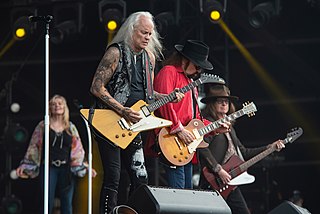
Lynyrd Skynyrd is an American Southern rock band formed in Jacksonville, Florida in 1964. The group originally formed as My Backyard and comprised Ronnie Van Zant (vocals), Gary Rossington (guitar), Allen Collins (guitar), Larry Junstrom (bass), and Bob Burns (drums). The band spent five years touring small venues under various names and with several lineup changes before deciding on "Lynyrd Skynyrd" in 1969. The band released its first album, (Pronounced 'Lĕh-'nérd 'Skin-'nérd), in 1973. By then, they had settled on a lineup that included bassist Leon Wilkeson, keyboardist Billy Powell, and guitarist Ed King. Burns left and was replaced by Artimus Pyle in 1974. King left in 1975 and was replaced by Steve Gaines in 1976. At the height of their fame in the 1970s, the band popularized the Southern rock genre with songs such as "Sweet Home Alabama" and "Free Bird". After releasing five studio albums and one live album, the band's career was abruptly halted on October 20, 1977, when their chartered airplane crashed, killing Van Zant, Steve Gaines, and backup singer Cassie Gaines, and seriously injuring the rest of the band.

Southern rock is a subgenre of rock music and a genre of Americana. It developed in the Southern United States from rock and roll, country music, and blues and is focused generally on electric guitars and vocals. Author Scott B. Bomar speculates the term "Southern rock" may have been coined in 1972 by Mo Slotin, writing for Atlanta's underground paper, The Great Speckled Bird, in a review of an Allman Brothers Band concert.

Catch a Fire is the fifth studio album by the reggae band The Wailers, released in April 1973. It was their first album released by Island Records. After finishing a UK tour with Johnny Nash, they had started laying down tracks for JAD Records when a disputed CBS contract with Danny Sims created tensions. The band did not have enough money to return to Jamaica, so their road manager Brent Clarke approached producer Chris Blackwell, who agreed to advance The Wailers money for an album. They instead used this money to pay their fares back home, where they completed the recordings that constitute Catch a Fire. The album has nine songs, two of which were written and composed by Peter Tosh; the remaining seven were by Bob Marley. While Bunny Wailer is not credited as a writer, the group's writing style was a collective process. For the immediate follow-up album, Burnin', also released in 1973, he contributed four songs. After Marley returned with the tapes to London, Blackwell reworked the tracks at Island Studios, with contributions by Muscle Shoals session musician Wayne Perkins, who played guitar on three overdubbed tracks. The album had a limited original release under the name The Wailers in a sleeve depicting a Zippo lighter, designed by graphic artists Rod Dyer and Bob Weiner; subsequent releases had an alternative cover designed by John Bonis, featuring an Esther Anderson portrait of Marley smoking a "spliff", and crediting the band as Bob Marley and the Wailers.
Alabama has played a central role in the development of both blues and country music. Appalachian folk music, fiddle music, gospel, spirituals, and polka have had local scenes in parts of Alabama. The Tuskegee Institute's School of Music, especially the Tuskegee Choir, is an internationally renowned institution. There are three major modern orchestras, the Mobile Symphony, the Alabama Symphony Orchestra and the Huntsville Symphony Orchestra; the last is the oldest continuously operating professional orchestra in the state, giving its first performance in 1955.

Ronald Wayne Van Zant was an American singer, best known as the founding lead vocalist and primary lyricist of the southern rock band Lynyrd Skynyrd. He was the older brother of Johnny Van Zant, the current lead vocalist of Lynyrd Skynyrd, and Donnie Van Zant, the founder and vocalist of the rock band .38 Special.
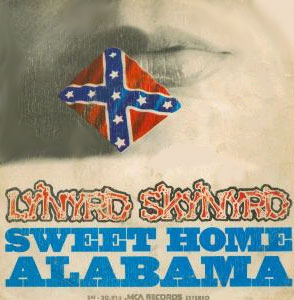
"Sweet Home Alabama" is a song by American rock band Lynyrd Skynyrd, released on the band's second album Second Helping (1974). It was written in response to Neil Young's 1970 song "Southern Man", which the band felt blamed the entire South for American slavery; Young is name-checked and dissed in the lyrics. It reached number eight on the Billboard Hot 100 chart in 1974, becoming the band's highest-charting single.

Edward Calhoun King was an American musician. He was a guitarist for the psychedelic rock band Strawberry Alarm Clock and guitarist and bassist for the Southern rock band Lynyrd Skynyrd from 1987 to 1996.

(Pronounced 'Lĕh-'nérd 'Skin-'nérd) is the debut studio album by American rock band Lynyrd Skynyrd, released on August 13, 1973, by MCA Records. Several of the album's tracks remain among the band's most well-known: "Gimme Three Steps", "Simple Man", "Tuesday's Gone", and "Free Bird", the last of which launched the band to national stardom.

Second Helping is the second studio album by Lynyrd Skynyrd, released on April 15, 1974. It features the band's biggest hit single, "Sweet Home Alabama", an answer song to Neil Young's "Alabama" and "Southern Man", which reached #8 on the Billboard Hot 100 chart in August 1974.

Street Survivors is the fifth studio album by the Southern rock band Lynyrd Skynyrd, released on October 17, 1977. The LP is the last Skynyrd album recorded by original members Ronnie Van Zant and Allen Collins, and is the sole Skynyrd studio recording by guitarist Steve Gaines. Three days after the album's release, the band's chartered airplane crashed en route to Baton Rouge, Louisiana, killing the pilot, co-pilot, the group's assistant road-manager and three band members, and severely injuring most who survived the crash.
Jimmy Ray Johnson was an American session guitarist and record producer.

Lynyrd Skynyrd 1991 is the sixth studio album by American Southern rock band Lynyrd Skynyrd. It was the band's first new studio album since 1977's Street Survivors and the first following a 1977 plane crash that claimed the lives of three members of the band.

Rick Medlocke is an American musician, best known as the frontman/guitarist for the Southern rock band Blackfoot and a member of Lynyrd Skynyrd. During his first stint with Lynyrd Skynyrd from 1971 to 1972, he played drums and sang lead on a few songs that would initially be released on 1978's "First and... Last." Medlocke would rejoin Blackfoot in 1972 and later returned to Lynyrd Skynyrd in 1996 as a guitarist with whom he continues to tour and record today.
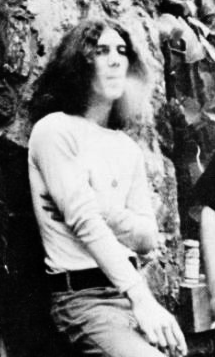
Robert Lewis Burns Jr. was an American drummer who was in the original lineup of the southern rock band Lynyrd Skynyrd.
The Muscle Shoals Rhythm Section is a group of American session musicians based in the northern Alabama town of Muscle Shoals. One of the most prominent American studio house bands from the 1960s to the 1980s, these musicians, individually or as a group, have been associated with more than 500 recordings, including 75 gold and platinum hits. They were masters at creating a southern combination of R&B, soul and country music known as the "Muscle Shoals sound" to back up black artists, who were often in disbelief to learn that the studio musicians were white. Over the years from 1962 to 1969, there have been two successive groups under the name "Muscle Shoals Rhythm Section" and the common factor in the two was an association with Rick Hall at FAME Studios in Muscle Shoals.

Muscle Shoals Sound Studio is an American recording studio in Sheffield, Alabama, formed in 1969 by four session musicians known as The Muscle Shoals Rhythm Section. They had left nearby FAME Studios in Muscle Shoals to create their own recording facility.

Skynyrd's First and...Last was the original name of the posthumous compilation album first released in 1978 by the rock band Lynyrd Skynyrd. In 1998, it was repackaged, renamed and re-released as Skynyrd's First: The Complete Muscle Shoals Album, being expanded to include eight additional tracks – four of which were previously unreleased and four which would be re-recorded for (Pronounced 'Lĕh-'nérd 'Skin-'nérd). As the renamed title suggests, the album was recorded at Muscle Shoals Sound Studio in Alabama. Originally intended to be their debut album it was shelved, making (Pronounced 'Lĕh-'nérd 'Skin-'nérd) their actual debut. The album was certified Gold on September 8, 1978 and Platinum on November 10, 1978 by the RIAA.
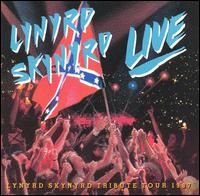
Southern by the Grace of God is a live album by southern rock band Lynyrd Skynyrd, recorded during the Lynyrd Skynyrd Tribute Tour in 1987. These live concerts were a 10-year anniversary tribute by Lynyrd Skynyrd to the members of the band who had died in a 1977 plane crash. The plane crash killed frontman Ronnie Van Zant, guitarist Steve Gaines, backing vocalist Cassie Gaines and road manager Dean Kilpatrick.

Barry Edward Beckett was an American keyboardist, session musician, record producer, and studio founder. He is best known for his work with David Hood, Jimmy Johnson, and Roger Hawkins, his bandmates in the Muscle Shoals Rhythm Section, which performed with numerous notable artists on their studio albums and helped define the "Muscle Shoals sound".
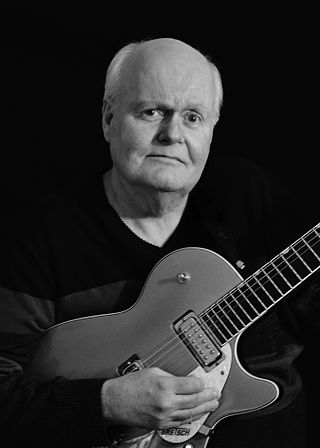
Jesse Willard "Pete" Carr was an American guitarist. Carr contributed to successful recordings by Joan Baez, Luther Ingram, Bob Seger, Paul Simon, Willie Nelson, Joe Cocker, Boz Scaggs, Percy Sledge, The Staple Singers, Rod Stewart, Barbra Streisand, Wilson Pickett, Hank Williams, Jr., and many others, from the 1970s onward.
















